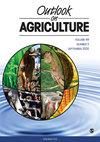The role of small abattoirs in the delivery of the UK's new agricultural policy objectives
IF 2.6
3区 经济学
Q1 AGRICULTURE, MULTIDISCIPLINARY
引用次数: 3
Abstract
This study examines the impacts of the reduction in the network of private kill abattoirs on the delivery of public goods supported under the redesigned UK agriculture policy. An online survey was used to gather information about farmers selection and use of abattoirs, and a telephone survey of abattoir owners and managers complemented the farmer survey. Of the 300 respondents, 185 used abattoirs for private kill retail (PKR) services. 121 of these PKR farmers (65.4%) reported their PKR business as “essential” “or “very important” to the viability of their farm business. Seventy-five (41%) had no alternative abattoir, 21 of these 75 would have to close their PKR business if the abattoir they currently used closed, 22.7% would reduce their grassland area, releasing greenhouse gases, and 30% would stop farming native breeds, reducing the gene pool and conservation grazing environmental management options. 110 PKR farmers did have a viable alternative abattoir, but using it would increase livestock journeys, increasing greenhouse gas emissions and making it more likely farmers would need to use commercial rather than farm transport, further jeopardising animal welfare and biosecurity. Therefore, the continuing closure of private kill services threatens core government policy objectives. However, private kill services could be supported by government grant schemes, resolving confusion regarding food labelling, and reducing small abattoir costs by introducing “de minimis” derogation – as currently used on some Channel Island and mainland Europe abattoirs.小型屠宰场在实现英国新农业政策目标中的作用
这项研究考察了私人屠宰场网络的减少对重新设计的英国农业政策支持的公共产品交付的影响。一项在线调查用于收集农民选择和使用屠宰场的信息,一项针对屠宰场所有者和管理人员的电话调查补充了农民调查。在300名受访者中,185人使用屠宰场提供私人屠宰零售服务。121名PKR农民(65.4%)表示,他们的PKR业务对其农场业务的生存能力“至关重要”或“非常重要”。75%(41%)的人没有其他屠宰场,如果他们目前使用的屠宰场关闭,其中21人将不得不关闭PKR业务,22.7%的人将减少草原面积,释放温室气体,30%的人将停止种植本地品种,减少基因库和保护性放牧环境管理选择。110 PKR农民确实有一个可行的替代屠宰场,但使用它会增加牲畜的行程,增加温室气体排放,使农民更有可能需要使用商业运输而不是农场运输,从而进一步危及动物福利和生物安全。因此,私人杀人服务的持续关闭威胁到政府的核心政策目标。然而,私人屠宰服务可以得到政府拨款计划的支持,解决食品标签方面的混乱,并通过引入“最低限度”的减损来降低小型屠宰场的成本——正如目前海峡岛和欧洲大陆的一些屠宰场所使用的那样。
本文章由计算机程序翻译,如有差异,请以英文原文为准。
求助全文
约1分钟内获得全文
求助全文
来源期刊

Outlook on Agriculture
农林科学-农业综合
CiteScore
5.60
自引率
13.30%
发文量
38
审稿时长
>36 weeks
期刊介绍:
Outlook on Agriculture is a peer reviewed journal, published quarterly, which welcomes original research papers, research notes, invited reviews and commentary for an international and interdisciplinary readership. Special attention is paid to agricultural policy, international trade in the agricultural sector, strategic developments in food production, the links between agricultural systems and food security, the role of agriculture in social and economic development, agriculture in developing countries and environmental issues, including natural resources for agriculture and climate impacts.
 求助内容:
求助内容: 应助结果提醒方式:
应助结果提醒方式:


